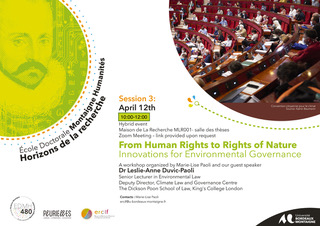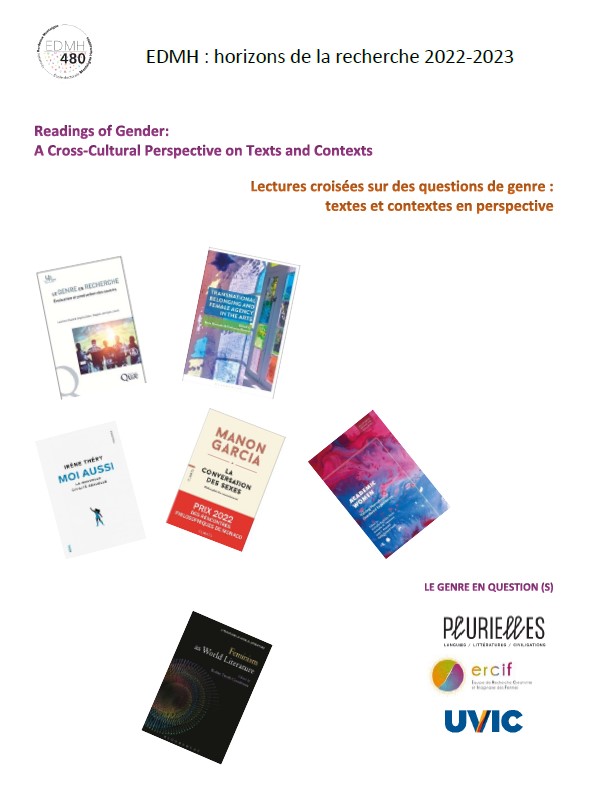
2023, Séminaire « Des droits humains aux droits de la nature »
Annonce de séminaire Ercif 11-12 avril
Pour le lancement de son programme « Biodiversité et pensée écologique dans l’imaginaire (du) féminin », l’ERCIF propose un séminaire en anglais sur le thème :
« Des droits humains aux droits de la nature »
dans le cadre des « Horizons de la recherche » de l’École Doctorale
Mode hybride : Maison de la Recherche et réunion Zoom
Lien de connexion sur demande à : ercif@u-bordeaux-montaigne.fr
Détail des 3 séances en bas de page
ENGLISH VERSION
From Human Rights to Rights of Nature: Innovations for Environmental Governance
A workshop organized by Dr Leslie-Anne Duvic-Paoli
Senior Lecturer in Environmental Law
Deputy Director, Climate Law and Governance Centre
The Dickson Poon School of Law, King's College London
This workshop aims to act as a multi-disciplinary forum to discuss the capacity of law to offer responses to the environmental emergency. Students are therefore encouraged to make links between the thematic focus of the workshop and their own discipline of study for a more holistic understanding of the relationship between law and society.
The workshop:
- is interested in how political and legal systems ought to be conceptualised differently in order to better respond to the environmental crisis.
The widespread adoption of environmental laws and policies world-wide since the 1970s has not prevented the continuing destruction of our planet. Instead, warnings about environmental degradation become increasingly pressing as time runs out to address the climate and biodiversity crises.
- focuses on two main obstacles that partly explain the lack of political action so far.
First, the inability of political systems to govern for the long-term and to favour societal interests over economic priorities; second, the anthropocentric approach of law that sees nature as separate from human systems and subject to appropriation, hence justifying its over-exploitation.
- offers students an opportunity to think anew about our political and legal systems by discussing alternative models of governance.
Two innovations in governance tools have recently emerged to challenge existing paradigms: citizens’ assemblies, founded on the idea that deliberations between citizens can offer a better suited alternative to representative democracy; and rights of nature, also known as Earth rights, that aim to give legal personality to natural elements such as rivers, lakes, mountains and forests.
No prior legal knowledge is necessary to join the workshop; instead, a socio-legal lens will be adopted to evaluate the relationship between society and the law in the context of the environmental crisis. To facilitate discussions, students are asked to watch two short documentaries (available online) prior to the seminar to gain a better understanding of the two mechanisms under study:
- On the French citizens’ assembly on climate: Yann Arthus-Bertrand, Les 150, 2021, 50min.
- On the idea of rights of nature: Isaac Goeckeritz, Hal Crimmel, and María Valeria Berros, The Rights of Nature: A Global Movement, 2018, 52 min.
The workshop consists of three sessions of 2 hours:
- The first session starts with an introduction to the relationship between environmental protection and human rights. Human rights and the environment are indeed closely intertwined: human rights cannot be enjoyed without a safe, clean and healthy environment, and the environmental crisis cannot be governed without respecting and protecting human rights. Questions to be discussed will include: To what extent can human rights be mobilised as a tool for environmental protection? Can specific environmental rights, such as the right to water or the right to a safe environment, provide an answer to the environmental crisis? What are the shortcomings of a rights discourse to the climate emergency?
- The second session concentrates on a procedural human right, the right to public participation in decision-making that affect the environment. The main focus will be on climate citizens’ assemblies, which are new forums of deliberative democracy which bring together citizens representative of a country’s society to debate and advise on how to reduce greenhouse gas emissions. They have recently gained popularity as an innovative solution to the failure of governments to respond to the climate emergency with adequate laws and policies. Nation-wide climate assemblies have been held in a number of European countries, including in France in the form of the Convention citoyenne pour le climat mandated by President Macron to respond to the Gilets Jaunes crisis. In this session, we discuss the limitations of the traditional model of representative democracy to govern the environmental crisis and reflect on the potential of deliberative forms of democracy to ensure a better representation of the peoples’ interests and priorities. How do climate assemblies challenge our conceptions of law-making? To which extent can they influence political action, and should they?
- The third and final session moves the discussion away from human rights to discuss another recent legal innovation - the recognition of the rights of nature, a recent movement that advocates a new relationship to nature, close to that of Indigenous communities that see themselves as connected to the environment, rather than as dominating it. Looking at case studies from Ecuador, New Zealand and India, where the rights of nature has been recognised by legislation and courts, the following key questions are addressed: How would a legal system recognising the rights of nature work? Who can speak for nature? Can a new philosophical foundation for environmental law help protect the environment better?


